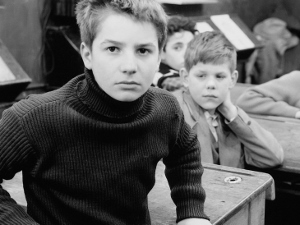The 400 Blows (1959)
[8]
François Truffaut made his feature directorial debut with this semi-autobiographical tale of a disenfranchised twelve-year-old Parisian boy who takes his first steps into a life of petty crime. Truffaut went into The 400 Blows with an admirable mission statement — to capture the very real malaise of pre-pubescence. Truffaut’s doppelganger is Antoine Doinel (Jean-Pierre Léaud), whose escalating infractions with his school and parents threaten to put him in reform school. But Doinel’s not willfully bad. Truffaut paints a picture of a boy who is a product of circumstance. He lies because his parents don’t believe him when he tells the truth. He steals because he needs the money when he’s too ashamed and afraid to come home. If he were really bad, he’d tell his step-dad that his mother is cheating on him, and he certainly wouldn’t try to return stolen goods. No, Doinel is the quintissential ‘lost boy,’ misunderstood, alienated, and alone.
The 400 Blows is a famous example of filmmaking under the French New Wave, combining cinema verite techniques with formal auteruism for a distinct, new style of moviemaking that feels both documentary and stylistically purposeful. The approach is certainly beguiling, but it’s the subtext of the piece that fascinates me more. The film shows how easily young men can fall by the wayside, and how readily society dismisses them. Truffaut ends the film with a series of long takes that culminates in a famous freeze-frame of Doinel looking straight into the camera’s lens. In that moment, as he looks to us in confusion and apprehension, Doinel’s problem become the audience’s problem and The 400 Blows becomes much more than an exercise in form or style. It becomes a powerful exercise in empathy.
I also have to single out a sequence in which an audience of children are watching a Punch and Judy puppet show. Truffaut captures authentic reactions from this young audience — they aren’t acting. Watching the little girls’ and boys’ faces morph between fear and laughter is simply magical.
Oscar Nomination: Best Original Screenplay



